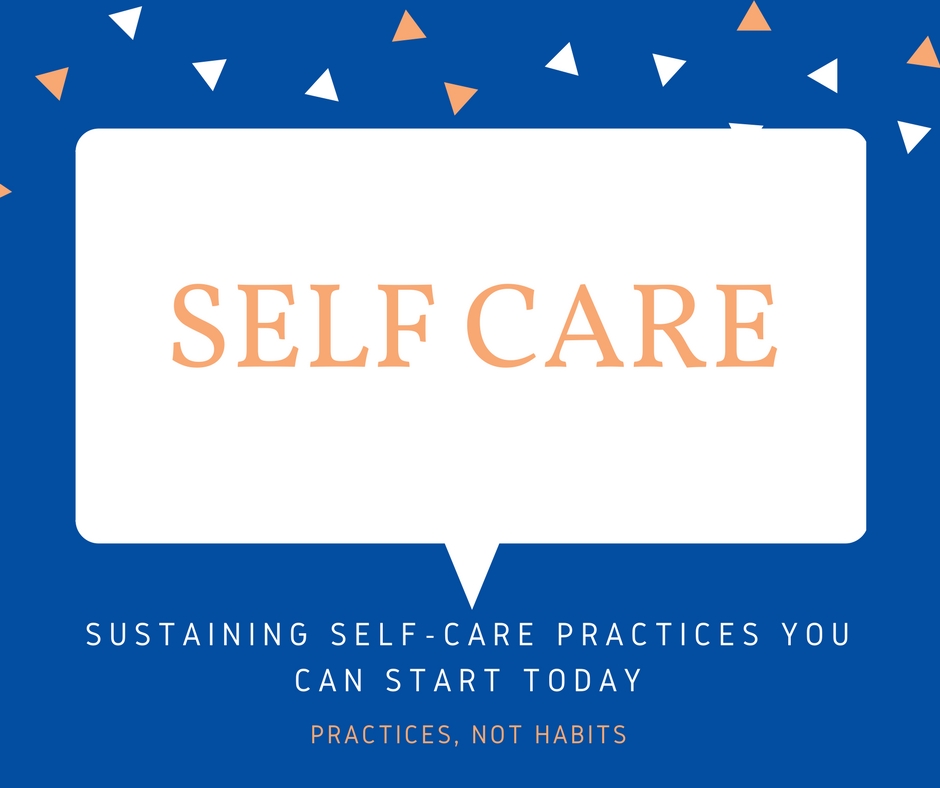Sustaining Self-Care Practices You Can Start Today
Sustaining Self-Care Practices You Can Start Today
By Heidi Schauster, MS, RDN, CEDRD-S
I invite you to develop your own unique palette of self-care practices. I use the word “practices” instead of “habits” or “routines” because you are trying something new and may need to keep at it for a while until that something new becomes a habit. Creating daily self-care practices helps us get our needs met by the ideal person to take care of those needs: ourselves. When we take good care of ourselves, we then have more space to reach out and nourish those we care about.
Self-care can be a challenge in busy lives. We spend our time attending to our work, our children, our friends, our homes, our communities—and all of that is wonderful and rewarding. Care of ourselves often gets squeezed out of the day. I believe that many of our chronic diseases, our mental illnesses, our growing fatigues, and our relationship challenges are often born out of deficits in self-care. These deficits could be failing to check in with ourselves during the day, not appreciating what we are feeling or needing, and not knowing when enough is enough.
Sometimes we get to the end of the day and feel depleted. We fall into habits that aren’t sustaining us. Sometimes we punish ourselves with over- or under-indulgence of food. Why do we do this? We do this because the food is tied closely to expressing our larger needs and hunger. It has been so since the time that we cried for our mother’s care and feeding on our first day as a human being. Whether we want it to be or not, food will always be associated with love and care and asking for what we need. Our brains are wired that way from day one on this planet.
Sometimes we try to cram so many things into a short day or week—even if they are rich, meaningful experiences—that we suffer from a lack of spaciousness. Spaciousness is my favorite self-care practice, and I am the first one to admit that I struggle with lack of it. Spaciousness is that luscious time that unfolds naturally in the present moment. In the unfolding, we have room to breathe, to create, to reflect, to have insights, and to make a connection with those we love. At those times, we not only have time to get in touch with ourselves and what we want and need, we have the time to make requests that might help us meet those needs. This means food, movement, sleep, rest, connection, among other needs.
I believe that spacious moments encourage creative and spiritual growth spurts.
I grow more deeply connected to my family when we have some lazy, unstructured time together. When I have spacious moments alone, I have insights, notice what’s going on inside of me and outside of me, and I notice (when I’m really spacious) that it’s all connected.
Sometimes my clients discover that those mini-food breaks during the day (you know, the ones where you aren’t hungry but find yourself foraging?) are the sensory part of our yearning. Something rich to eat might give us a five-minute moment of bliss (goddess forbid we stop for more than five minutes!), but is that really what we crave? Perhaps what we really want is the richer taste of spacious time to do or be or create whatever it is that calls to us. We might need to occupy our senses if we’ve been staring at a computer screen, but we might not really be hungry. Sometimes we feel that we don’t deserve those regenerative moments—but maybe we deserve a bit of chocolate. Often there is a deeper need that wants to be met and the food is a stand-in.
Discovering our own sustaining self-care practices takes some listening and investigation. While you have to decide which self-care practices really resonate best for you, I’m going to make a few suggestions that are on me and some of my clients’ lists of daily or weekly practices:
Consistent, Nourishing Eating Patterns
- Exercise/Movement
- Creating Spaciousness
- Sleep
- Meditation
- Pausing Regularly to Check in with Self and Values Writing/Journaling
- Setting Intentions
- Being in Nature
- Creative Pursuits
- Deep Connection with Others
- Physical Touch/Hugs/Snuggling Conscious Breathing
Add any others that help you feel grounded, present, and deeply nourished. You don’t have to do these all at once. I recommend picking one or two self-care practices that resonate with you. Once they’ve become more habitual, choose another. You will be amazed at how much better you feel when you take this intentional time for yourself. And sometimes compulsive eating or restricting of food takes a back seat when other needs are regularly being met. When you devote energy to taking good care of yourself—really nourishing your spirit and soul—then any power that food has over you becomes weaker. You also have more energy to give to others and may find yourself more generous than you are when “running on fumes.” Take some spacious time to listen deeply, experiment, and discover what you hunger for. All of your relationships will thrive when you first honor yourself.
Heidi Schauster, MS, RDN, CEDRD-S is the author of Nourish: How to Heal Your Relationship with Food, Body, and Self. She is a nutrition therapist, writer, and the founder of Nourishing Words Nutrition Therapy. Heidi facilitates the No Diet Book Clubs, supervises other nutrition therapists who treat disordered eating, and encourages embodied eating and living for all. For more information, please visit, www.anourishingword.com.




































